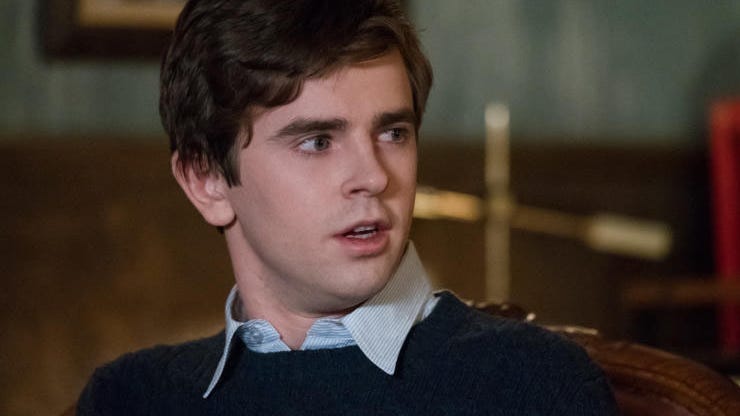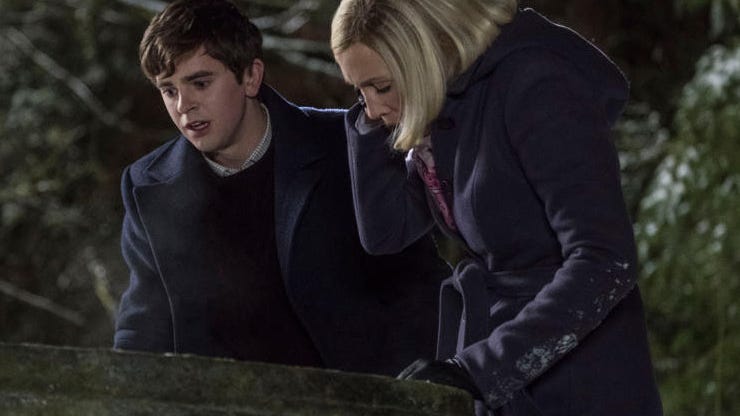Join or Sign In
Sign in to customize your TV listings
By joining TV Guide, you agree to our Terms of Use and acknowledge the data practices in our Privacy Policy.
Bates Motel Checks Out With a Strong Series Finale
A&E's psychological thriller's series finale is as solid as Norma's frozen body
(Warning: Spoilers for the series finale of Bates Motel past this point!)
Bates Motel ended its five-season run Monday night, bringing the story of excitable boy Norman Bates (Freddie Highmore) and his overprotective, deceased mother Norma (Vera Farmiga) to a suitably tragic and elegant close.
With finale "The Cord," the series remains an extremely dysfunctional family drama to the very end, with stepson killing stepfather -- Norman shooting revenge-crazed former sheriff Alex Romero (Nestor Carbonell) after getting the drop on him while he cried over the body of his beloved, frozen wife -- and brother killing brother (also cousin killing cousin [like I said, dysfunctional]) when Dylan (Max Thieriot) shoots Norman when Norman lungs at him with a knife in a move that's less an attack than a suicide attempt so he can join his mother. But there's also Dylan's act of emotional cruelty against his wife Emma (Olivia Cooke), who's suffered as much as anyone with with Calhoun-Massett-Bates blood, when he tells her "I'll never love anyone else but you" right before he goes to have his final confrontation with Norman, against her reasonable wishes. Even the good guy on this show is broken.
But as has always been the case with Bates Motel, the emotional moments hit harder than the violent ones, thanks to Farmiga and Highmore's performances and co-creators Carlton Cuse and Kerry Ehrin's script. Norman's dying vision of running into his mother's arms in the forest, in which some shots he was a little boy, hit the right, complex note of how though their love caused so much death and destruction, it was genuine. It was sick and unnatural that they were the only people for each other, but they were their own world of two nonetheless.

Freddie Highmore, Bates Motel
Thieriot got the finale's summary speech. He comes to the motel at his missing-person brother's invitation and sees his mother's body dressed up and seated at the dining room table, which makes him throw up. He tells Norman that he has to turn himself in and start getting the help he needs. Norman resists.
"That's what you want for me?" Norman says. "To be shut up in some prison for the criminally insane and drugged out of my mind?"
"I don't know what I want for you," says Dylan. "What I really want is something that can never happen. I want you to be happy and I want you to be well. I want Mom to be alive again. I want you guys to meet my daughter. I want to have Christmases together, okay? I want all of these things to have never happened."
It's a heartbreaking speech about how who Norman and Norma were had consequences that would always prevent them from being a "normal" family. And though a lot of it, like Norma's history of abuse and Norman's mental illness, wasn't their fault and they were dealt a bad hand, they still did things that made any hope of a happy life impossible. The scenes earlier in the episode that cut between Norman's memories of Norma's excitement at the prospect of starting over in White Pine Bay and the hopeless, bloody present previewed that painful conclusion.
The end wasn't all bleak, though. A flash-forward set to Doris Day's "Dream A Little Dream of Me" showed a beaming young couple buying the motel, Dylan and Emily and their daughter as a happy, loving family, and Norman and Norma's shared gravestone, at peace at last. The music cue is a little trite, but the montage was an effective coda to the series.

Freddie Highmore and Vera Farmiga, Bates Motel
A&EBates Motel premiered in March 2013, about six weeks after Netflix's House of Cards started the Peak TV era, and it remains one of the defining shows of the content-deluged era we're living in. At the time, it was sort of a surprise -- an original scripted series on a network better known for its reality programming with A-list talent in front of the camera (Farmiga was just a few years removed from an Oscar nomination for Up In the Air) and behind it (Carlton Cuse was the co-showrunner for Lost and Kerry Ehrin wrote for Friday Night Lights). It was based on a well-established franchise (Alfred Hitchcock's Psycho) that was being updated for a modern audience while trying to hook viewers through name recognition. Now it feels like every channel and streaming platform has at least one attempt at a prestige-y show, and the seemingly endless supply of reboots, revivals and reimaginings shows no sign of running out.
But no other show in its class of mid-level reboots has been as successful as Bates Motel. It's maintained a high level of quality throughout its run and used its source material in creative and surprising ways, both of which can be seen in Season 5's terrific Rihanna-as-Marion-Crane arc. It's a master class on how to breathe new life into an old franchise and how to respect source material without being beholden to it.
At the same time, it's been never at the center of the conversation. Farmiga got an Emmy nomination for the first season, but that was it (it did win a handful of People's Choice Awards in January, evidence of how dedicated its fans are). It never got the ratings of an AMC show or the critical attention of an FX show. It's always been overshadowed by bigger, buzzier, more audacious shows. It's a quintessential "oh, I heard that's good" show. There's so much good TV that it's easy to overlook smaller, reliable genre shows like Bates Motel.
And it's not a knock on Bates Motel to say that it doesn't need anyone to say "Bates Motel is underappreciated." It's pretty accurately appreciated as a mildly important show that's been very good 'til the bitter end.
